You likely know that golden retrievers are active, playful dogs that require plenty of daily exercise. But how much activity do they need daily?
Golden retrievers require at least two hours of exercise per day as young adults. Puppies’ activity levels should be limited to prevent joint issues later in life, and seniors may struggle to keep the same pace as they did in their younger years.
In this article, we’ll discuss how much exercise golden retrievers need based on age, health, and more. We’ll also talk about how to exercise your dog, provide mental enrichment, and how often they need to potty.
How Much Daily Activity do Golden Retrievers Need?
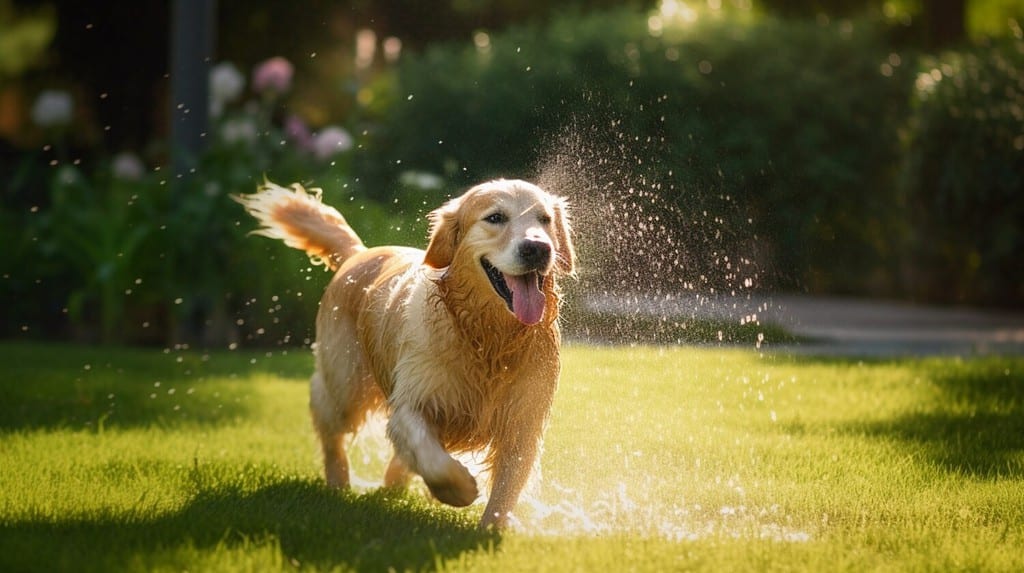
Adult golden retrievers need upwards of two hours of exercise per day.
©Donamen/Shutterstock.com
Every golden retriever is different. Healthy adults need at least two hours of exercise daily.
Their fitness needs can vary based on age, personality, physical fitness, and health. For instance, puppies shouldn’t participate in strenuous activities such as jumping or running long distances. Dogs with health problems may need their activities restricted as they heal or even permanently.
Let’s dive into all of the factors at play when it comes to golden retriever activity levels.
Golden Retriever Exercise Level by Age
Golden retriever puppies can be overexercised easily, and this can affect their growth and development. Puppies who get too much exercise are more at risk of joint issues such as hip dysplasia.
Puppies also have shorter attention spans than adult dogs and sleep much more–up to 19 hours each day! They do best with short but frequent bursts of activity rather than long walks or runs.
Once fully grown, they can tolerate more vigorous exercise and have more stamina. Young adults should get two or more hours of exercise each day.
Senior golden retrievers will typically slow down with age, but every dog is different. Take things at their pace and pay attention to signs that they’re overtired.
Golden Retriever Exercise Level by Personality
Personality also plays a role in how much exercise your golden retriever will need. Some are content with two hours of exercise, while others will still be hyperactive and need more activity.
Just like people, some dogs will be ready to go no matter how much exercise they get, while others will be content to lounge around the house after they’ve been tired out.
Golden Retriever Exercise Level by Fitness
If you’re constantly going on long hikes or runs with your golden retriever, they’re going to get used to this activity level. As a result, they’ll need more exercise than a dog that’s used to the bare minimum.
Golden retrievers are adaptable dogs and, so long as they’re getting their two hours in, can typically adjust to your routine and preferences.
Golden Retriever Exercise Level by Health Level
Of course, various health conditions can slow a golden retriever down. Joint issues, heart problems, and other conditions can make exercise difficult.
If your dog has a health problem, consult with their veterinarian to see if your exercise routine should change. It’s also important to take things at your dog’s pace, never pushing them for more than they can handle.
How to Exercise Your Golden Retriever
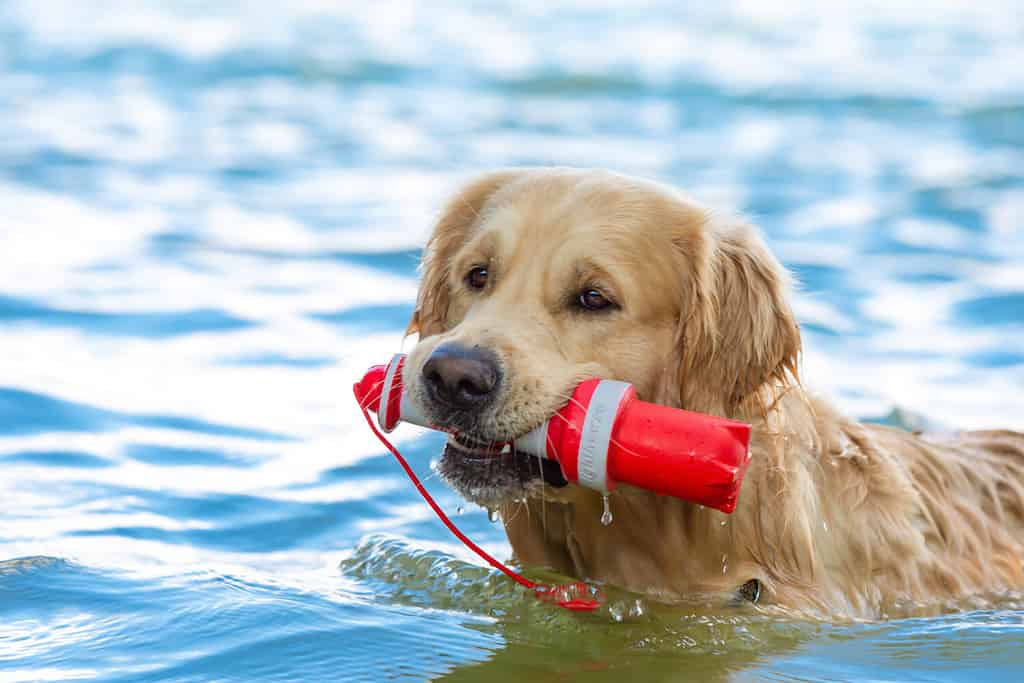
Swimming provides great exercise for golden retrievers and is gentle on the joints.
©demanescale/Shutterstock.com
- Daily walks, runs, or hikes provide plenty of mental stimulation and exercise for your golden retriever. Ideally, they’ll be getting multiple walks per day.
- Flirt poles are like giant cat toys that allow your dog to act on their prey drive without hurting real animals. They’re also seen as a healthier alternative to fetch.
- Games of fetch can still be great, especially for retrievers. Just make sure your dog doesn’t get obsessed with the game and overexert themselves.
- Games of tug let your golden use their teeth and strength. Remember that it’s important to let the dog win frequently so that the game stays fun!
- Swimming is an activity that most golden retrievers love since they were bred to hunt birds in the water. Adding toys for them to retrieve can increase the fun.
- Dog sports such as agility or tracking can provide entertainment for you and your dog. Just be sure not to start agility training too early, as jumping can be detrimental to a puppy’s joint health.
Mental Enrichment for Golden Retrievers
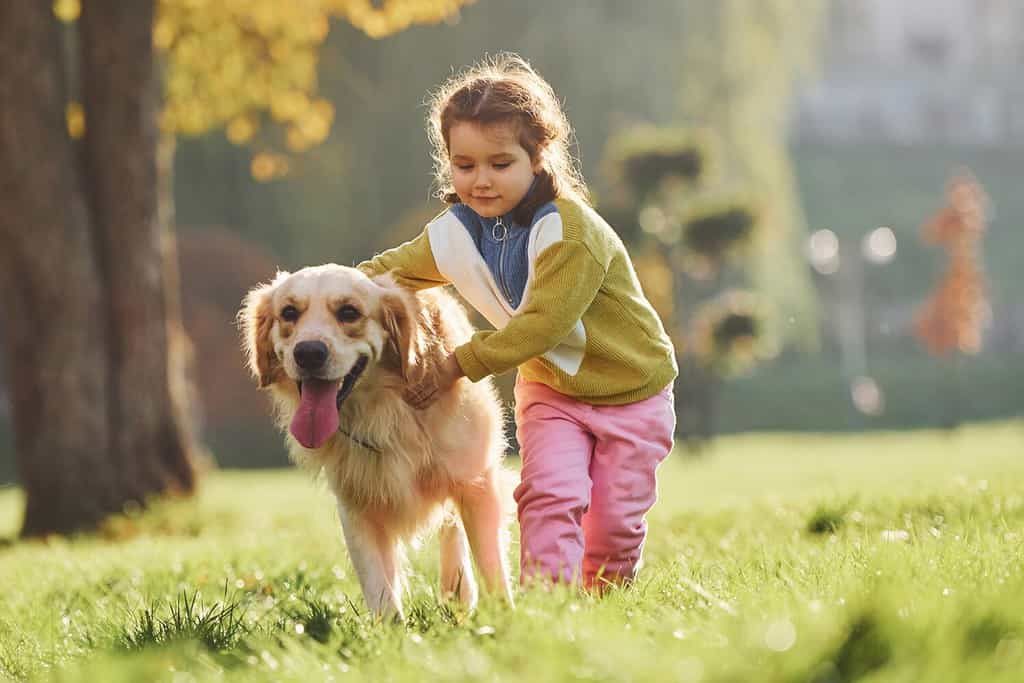
Your dog can become easily bored, so incorporate daily training and sniff walks for mental enrichment.
©Standret/Shutterstock.com
Mental enrichment is just as important as physical activity. Without it, goldens can become bored, anxious, and destructive. If you seem to always be exercising your dog and they still aren’t tired, they likely need more mental stimulation.
Here are some ways to keep your golden retriever from becoming bored:
- Daily training helps whether you’re practicing old cues or learning new ones. Goldens are intelligent dogs that can learn quickly and enjoy training.
- Puzzle toys make a golden retriever think about how to retrieve treats and are a great way to make kibble more engaging.
- Hide and seek can be played using treats, toys, or even people! Start with the smelliest treats and work your way toward items with a harder-to-find scent.
- Sniff walks are walks where your golden gets to go at their pace and sniff as much as they want, which can be quite tiring as it provides lots of mental stimulation.
- Learning to fetch items such as the remote or bottles of water engages their retrieving instincts in a useful way.
- Learning the names of toys is an easy way to keep them engaged. You can ask them to find individual toys, bring them to you, or even put them away in a toy basket.
Can You Overexercise a Golden Retriever?
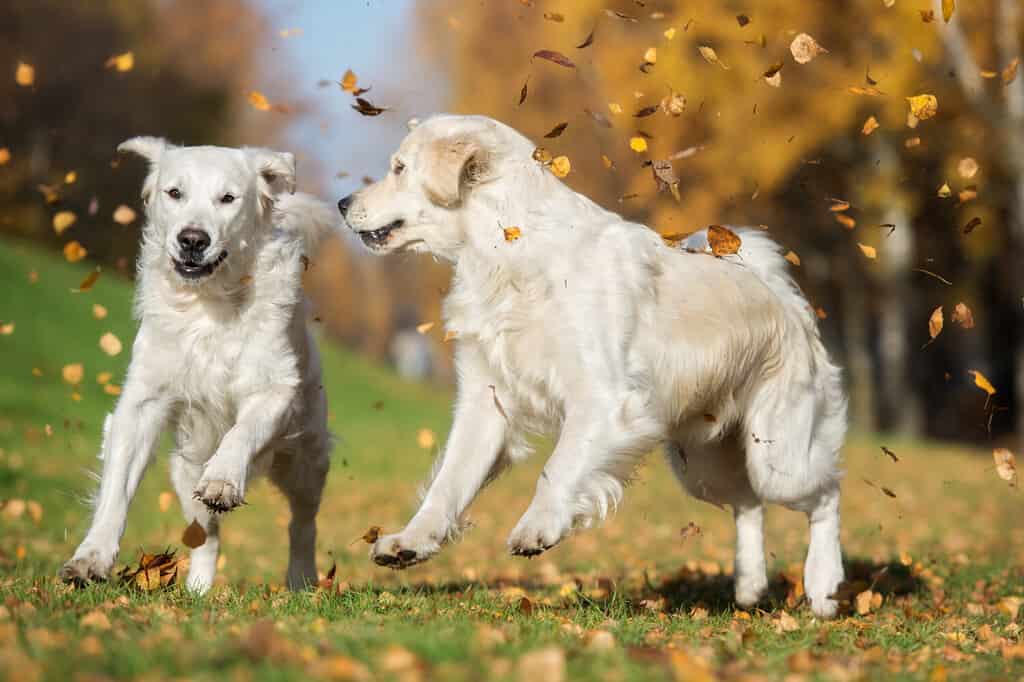
Restricting your puppy’s activity levels can be better for their joints in the longterm.
©otsphoto/Shutterstock.com
You can overexercise your golden, though this is harder to do for a healthy adult dog. Puppies and seniors are more easily overexerted.
Too much exercise before your dog is fully grown can increase their risk of developing joint problems. Overexercising seniors can worsen their health or lead to heat stroke.
To avoid overexerting your dog at any age, take activities at their pace. If they want to stop or slow down, listen to their cues.
Also, learn to watch them for signs that they’re too tired or hot, such as panting from the side of the mouth, excessive panting or drooling, and moving slower than normal. If your dog crashes for long periods after exercise, this can be another sign that you’re overdoing it.
It’s also vital your dog gets enough sleep during the day. Puppies need up to 19 hours of sleep, while adult dogs can need as many as 14 hours. Seniors go back to sleeping more often and may need up to 20 hours of sleep per day.
How Often Should I Take my Golden Retriever Out to Pee?
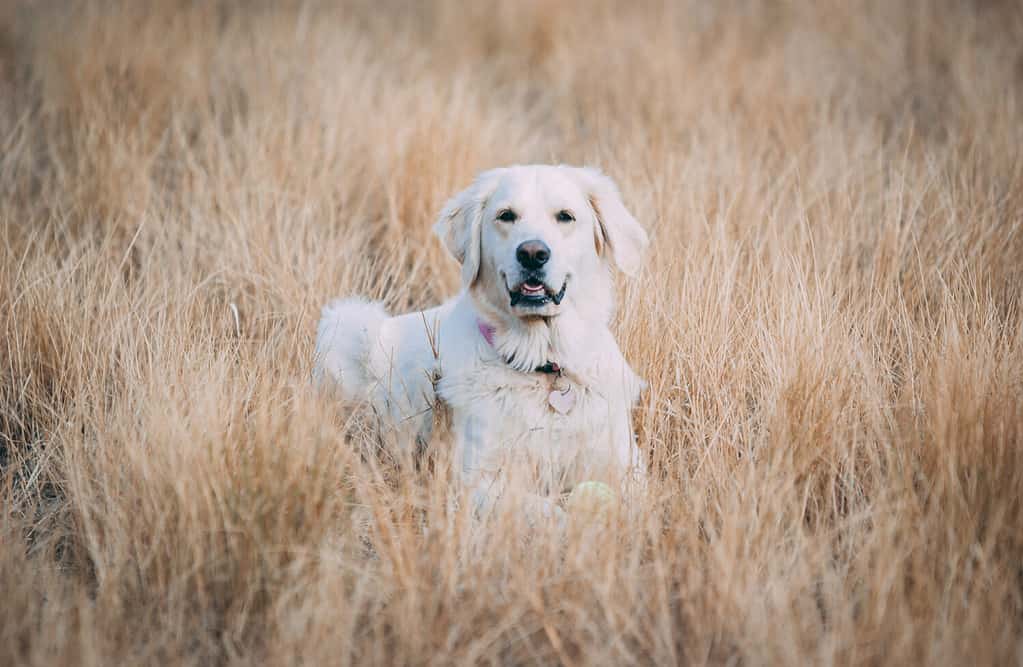
Adult golden retrievers can hold their bladders for several hours, however, puppies and senior dogs need to go out more regularly.
©davisdeatonphotography/Shutterstock.com
Golden retriever puppies can only hold their bladders for around one hour per month of age. Young adults can hold it for 6-8 hours healthily, with any more putting them at risk of urinary issues. Senior dogs often need to go out more regularly as it becomes harder to hold their urine as they age.
You’ll likely be letting your golden retriever out to potty more often than you take them for walks. If you’re home and able, it’s best to let them out whenever they ask–after all, no one wants to hold their pee when they have to go!
If you work full-time outside of the home and no one else is around to take the dog out, it’s best to hire a dog walker for a mid-day potty break. This ensures your golden retriever won’t have to hold their bladder for longer than is healthy and also gives them a chance to stretch their legs while you’re gone.
Thank you for reading! If you have feedback on this post, please contact the AZ Animals editorial team.
The photo featured at the top of this post is © Donamen/Shutterstock.com
Ready to discover the top 10 cutest dog breeds in the entire world?
How about the fastest dogs, the largest dogs and those that are -- quite frankly -- just the kindest dogs on the planet? Each day, AZ Animals sends out lists just like this to our thousands of email subscribers. And the best part? It's FREE. Join today by entering your email below.
Thank you for reading! Have some feedback for us? Contact the AZ Animals editorial team.







